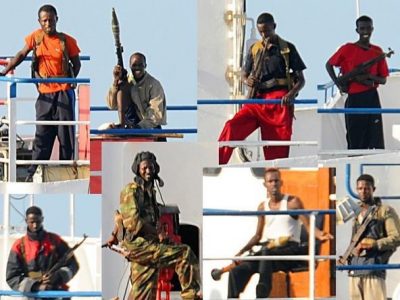Somali Pirates to Execute Abducted British Couple
Somali Pirates Threaten to Execute Abducted British Couple
Somali pirates have issued a chilling ultimatum: British couple Paul and Rachel Chandler will be executed if any more rescue attempts are made to free them.
The couple—59-year-old retired quantity surveyor Paul, and 55-year-old economist Rachel—disappeared on October 23, 2009, while sailing their yacht Lynn Rival from the Seychelles to Tanzania. A distress call was sent from the vessel during the attack. Less than a week later, a search team located the yacht, but the couple had already been abducted.
Held hostage for over 90 days, the Chandlers are reported to have been separated by their captors and subjected to systematic torture. UK naval personnel aboard the RFA Wave Knight witnessed the couple being transferred from their yacht to a container ship, MV Kota Wajah, near Ceel Huur, Somalia. They were later taken ashore.
Somali citizens in the UK have made humanitarian appeals for the couple’s release. Many hope that clarifying the Chandlers were neither dumping toxic waste nor fishing illegally in Somali waters may influence the pirates’ decision. The couple’s yacht was returned to the UK on November 26.
Piracy Becomes Somalia’s Dark Export
At Feelnubia, we recently spotlighted how piracy has morphed into Somalia’s most profitable industry. In one case, Somali pirates received a staggering $5.5 million ransom for releasing a Greek oil tanker seized on November 29, 2009, near the Seychelles.
The Maran Centaurus, loaded with 2 million barrels of crude oil and a 28-member crew—16 Filipinos, 9 Greeks, 2 Ukrainians, and 1 Romanian—was en route to the US from Saudi Arabia when attacked. As the ransom was about to be paid, a rival gang launched an assault in two speedboats. Their attempt was thwarted by two helicopters from a nearby warship.
Though the European Union’s anti-piracy force, led by Naval Commodore John Harbour, denied involvement, the timely air intervention helped secure the crew’s safe release. The tanker was later escorted to Durban, South Africa. Its cargo alone was worth an estimated $150 million.
From Fishermen to Armed Warlords
Somali piracy traces back to the 1991 civil war. As lawlessness spread, local fishermen aged 20 to 35—already devastated by foreign vessels illegally fishing their waters—turned to piracy.
Soon, warlords noticed the financial gains and began funding operations, sharing in the profits. The East African Seafarers’ Association now estimates over 1,000 men across five major pirate factions.
This surge in piracy has disrupted global shipping, prompting higher costs and heightened security. In response, the UN Security Council adopted a resolution on November 20, 2008, urging Somalia to act. But Somalia’s transitional government—still battling Islamic insurgents—lacks the capacity to respond effectively.
In January 2009, a $3 million ransom secured the release of the Sirius Star, another oil tanker. The crew was unharmed and the vessel departed Somalia with a Greek naval escort.
Botched Rescue, Lowered Demands
The Chandlers’ situation escalated after a failed rescue by the UK’s elite Special Boat Service (SBS). A technical hitch prevented the team from reaching the captives.
In frustration, the pirates renewed threats to kill the couple if their demands weren’t met in three to four days. Initially asking for $7 million, the pirates—through spokesman Gelle—have since lowered the figure to $2 million or “whatever price” is agreed upon.
They’ve expressed a willingness to negotiate, even as global pressure mounts.
A Humanitarian Crisis at Sea
The plight of the Chandlers highlights the complexity of modern piracy. What began as a fight for survival by disenfranchised fishermen has grown into a high-stakes industry fueled by desperation, greed, and lawlessness.
The cost? Innocent lives, rising fear on the seas, and mounting pressure on international powers to find lasting solutions.

